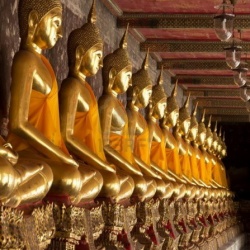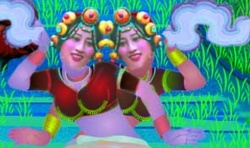Difference between revisions of "The three marks of conditioned reality"
| Line 1: | Line 1: | ||
[[File:12 mple.jpg|thumb|250px|]][[File:12 ory-top.jpg|thumb|250px|]][[File:2-pea-emme.jpg|thumb|250px|]] | [[File:12 mple.jpg|thumb|250px|]][[File:12 ory-top.jpg|thumb|250px|]][[File:2-pea-emme.jpg|thumb|250px|]] | ||
| − | |||
The [[Buddha]] taught that [[conditioned reality]] has three {{Wiki|characteristics}}: [[anicca]], [[dukha]], and [[anatta]]. [[Conditioned reality]] includes the [[six senses]] of [[eye]], {{Wiki|ear}} {{Wiki|nose}}, {{Wiki|tongue}}, [[body]], and [[mind]] and the [[world]] [[experienced]] through them. [[Anicca]] is the [[Pali]] [[word]] for [[impermanence]]. In [[conditioned reality]] everything is always changing, [[nothing]] stays the same. | The [[Buddha]] taught that [[conditioned reality]] has three {{Wiki|characteristics}}: [[anicca]], [[dukha]], and [[anatta]]. [[Conditioned reality]] includes the [[six senses]] of [[eye]], {{Wiki|ear}} {{Wiki|nose}}, {{Wiki|tongue}}, [[body]], and [[mind]] and the [[world]] [[experienced]] through them. [[Anicca]] is the [[Pali]] [[word]] for [[impermanence]]. In [[conditioned reality]] everything is always changing, [[nothing]] stays the same. | ||
| Line 14: | Line 13: | ||
In other words, based on our [[ignorance]] we mistakenly identify with our [[body]] and [[mind]] as who we are and we [[experience]] ourself as a separate {{Wiki|entity}} in a [[world]] around us. Upon [[awakening]] to our [[true nature]] this [[ignorance]] is destroyed. The [[Buddha]] often referred to himself as the [[Tathagata]] which means “one coming from [[suchness]]”. This [[suchness]] is our [[true nature]], the [[ground of being]]. As I understand it, [[conditioned reality]] [[manifests]] from and consists of [[suchness]]. The [[subject]] and [[object]] of [[awareness]] both [[manifest]] from the same ground and when a [[person]] realizes this fully then there is no more [[duality]], no more [[experience]] of being a separate [[self]] in [[time]] and [[space]], no more [[suffering]]. | In other words, based on our [[ignorance]] we mistakenly identify with our [[body]] and [[mind]] as who we are and we [[experience]] ourself as a separate {{Wiki|entity}} in a [[world]] around us. Upon [[awakening]] to our [[true nature]] this [[ignorance]] is destroyed. The [[Buddha]] often referred to himself as the [[Tathagata]] which means “one coming from [[suchness]]”. This [[suchness]] is our [[true nature]], the [[ground of being]]. As I understand it, [[conditioned reality]] [[manifests]] from and consists of [[suchness]]. The [[subject]] and [[object]] of [[awareness]] both [[manifest]] from the same ground and when a [[person]] realizes this fully then there is no more [[duality]], no more [[experience]] of being a separate [[self]] in [[time]] and [[space]], no more [[suffering]]. | ||
| − | + | ||
{{R}} | {{R}} | ||
| − | [http://johnfreese.wordpress.com/2011/09/10/the-three-marks-of-conditioned-reality/ johnfreese.wordpress.com] | + | [http://johnfreese.wordpress.com/2011/09/10/the-three-marks-of-conditioned-reality/ johnfreese.wordpress.com] |
| + | |||
[[Category:Reality in Buddhism]] | [[Category:Reality in Buddhism]] | ||
Revision as of 15:16, 28 November 2013
The Buddha taught that conditioned reality has three characteristics: anicca, dukha, and anatta. Conditioned reality includes the six senses of eye, ear nose, tongue, body, and mind and the world experienced through them. Anicca is the Pali word for impermanence. In conditioned reality everything is always changing, nothing stays the same.
The cells of our bodies are constantly being born and dying as we go from being a baby to an adult to an old person to death. Our thoughts and emotions are alway changing, one day we are happy, the next day we are sad, one minute we are thinking about this, the next minute we are thinking about that. Our physical health and material wealth are always changing. The world around us is always changing as it moves from day to night, month to month, season to season. Our relationships change, the weather changes, plants animals and humans are born and die, civilizations come and go, species come and go, even the earth and the sun manifested at one point and will disintegrate at one point. So nothing in conditioned reality is permanent.
Dukha is the Pali word that is normally translated as suffering but it also means the inability to satisfy. In conditioned reality we experience physical pain and disease, emotional pain, and spiritual pain. For many people it is a struggle just to survive. For others they may be materially secure but they are not happy in their family, relationships, career etc… Some people may be content with their family, job and relationships but they still feel unfulfilled deep down, they feel that something is missing, perhaps even an existential angst.
Some people may be overall content and free from worry but no matter how good we have it we will one day have to let go and therefore even the things in conditioned reality that bring us happiness contain within them the seeds of suffering. This is why the Buddha taught that conditioned reality is not able to permanently satisfy us and therefore has the characteristic of dukha. He said that the only thing that can bring us permanent happiness, satisfaction, and fulfillment is spiritual realization.
Anatta is the Pali word for non-self. A human being who is not realized (which is the vast vast majority of us) identifies with his or her body and mind as who he or she is. The Buddha said though that our body and mind are not who we are. Mind here includes the five sense consciousnesses of eye, ear, nose, tongue, and body, the mind consciousness which perceives thought and emotion, and the ego or the sense of being a distinct individual entity in time and space. The Buddha said that all of these things are impermanent and subject to birth and death, they are part of conditioned reality and are not self.
In contrast to conditioned reality the Buddha spoke of unconditioned reality. He said if it were not for the unconditioned there would be no liberation from the conditioned. The Buddha (whose name literally means “awakened one”) is somebody who woke up from his identification with conditioned reality and realized his true nature which is the unconditioned reality. He said that our identification with conditioned reality is like a man seeing a rope on the ground and mistakenly seeing it as a snake. He said that realizing the unconditioned reality is like the the man seeing the rope as it really is and realizing that there never was a snake in the first place.
In other words, based on our ignorance we mistakenly identify with our body and mind as who we are and we experience ourself as a separate entity in a world around us. Upon awakening to our true nature this ignorance is destroyed. The Buddha often referred to himself as the Tathagata which means “one coming from suchness”. This suchness is our true nature, the ground of being. As I understand it, conditioned reality manifests from and consists of suchness. The subject and object of awareness both manifest from the same ground and when a person realizes this fully then there is no more duality, no more experience of being a separate self in time and space, no more suffering.


